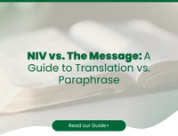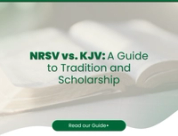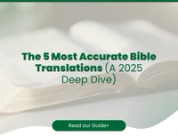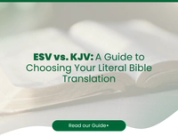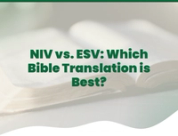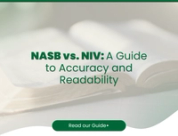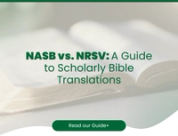For readers who want to get as close as possible to the original Hebrew and Greek texts, the conversation almost always leads to two premier translations: the New American Standard Bible (NASB) and the English Standard Version (ESV). Both are renowned for their commitment to a literal, "word-for-word" translation philosophy, making them the top choices for pastors, scholars, and anyone serious about in-depth study.
But while they share a common goal, they offer different reading experiences. One is arguably the most literal, grammatically precise translation on the market, while the other balances that same precision with a celebrated literary elegance.
So, which of these scholarly titans is the right one for your study desk? This guide will provide a deep dive into the NASB and ESV, helping you choose the best tool for your theological work.
The main difference between the NASB and the ESV is their approach to literal translation: the NASB is known for its strict, formal accuracy, making it one of the most literal translations available, while the ESV balances its word-for-word precision with a more literary and readable style.
At a Glance: Key Differences
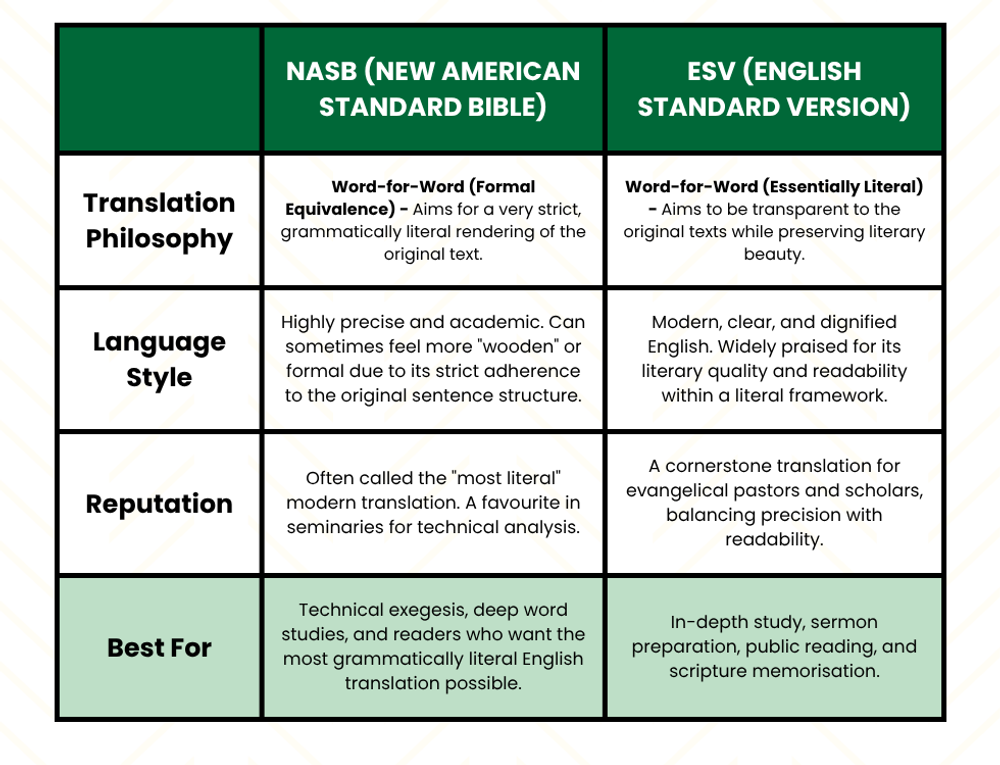
The NASB: The Pinnacle of Precision
The New American Standard Bible (NASB), most recently updated in 2020, was created with one overriding principle: to be as literal as possible. The translators sought to render the original Hebrew, Aramaic, and Greek texts into modern English with a level of grammatical accuracy that is second to none. This makes it an unparalleled tool for technical study. If you want to see how a Greek sentence was structured or perform a detailed word study, the NASB is an invaluable resource.
You should choose an NASB Bible if:
- Your highest priority is grammatical, word-for-word accuracy.
- You are a seminary student or scholar doing deep exegetical work.
- You want to see the structure of the original languages reflected in the English text.
Our Top Recommendation for an NASB Bible:
NASB Giant Print Reference Bible
A fantastic edition for serious study, this Bible features the ultra-literal NASB text with a comprehensive cross-reference system in a clear giant print text size. Shop Now
The ESV: A Legacy of Literary Excellence
The English Standard Version (ESV) was also created to be a faithful, "word-for-word" translation, but with a strong emphasis on literary quality. Standing in the classic tradition of the KJV, the ESV seeks to capture the dignity, beauty, and literary power of the original texts. It is highly trusted by pastors and scholars for its precision, but it is also beloved for its readability and rhythm that makes it excellent for public reading, preaching, and memorisation.
You should choose an ESV Bible if:
- You want a literal translation that is also elegant and highly readable.
- You are a pastor or teacher looking for a translation that is great for both the pulpit and personal study.
- You value a balance of scholarly precision and literary beauty.
Our Top Recommendation for an ESV Bible:
Widely considered one of the most comprehensive study Bibles available, offering extensive, scholarly notes, articles, and maps for serious study of the trusted ESV text. Shop Now
Making Your Choice: Precision or Readable Precision?
Choosing between the NASB and the ESV is a choice between two of the best literal translations available.
- For the most stringent, word-for-word accuracy for technical study, choose the NASB.
- For an accurate, literal translation that also prioritises literary beauty and readability, choose the ESV.
Both translations are a profound gift to the church and will serve you exceptionally well as you seek to understand God's Word with greater depth and confidence.
Our Bible Finder tool can help you find the perfect Bible.
Still not sure which Bible is right for you? You can learn more in our complete, free 97-page ebook, 'How to Choose Your Bible'.






